By Shawn Levy
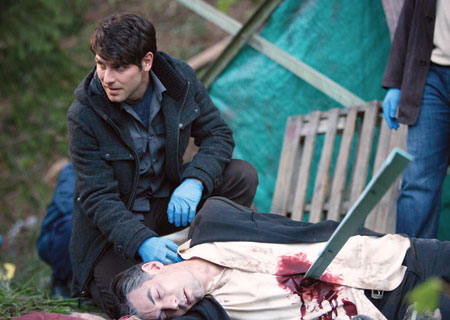 Grimm's star David Giuntoli has to investigate a stake in the heart. (Photo: Scott Green/NBC)
Grimm's star David Giuntoli has to investigate a stake in the heart. (Photo: Scott Green/NBC)
It is the Thursday after Memorial Day, and a weepy sky casts a pall above Portland, Oregon. A little nip rouses when the wind blows, which, gratefully, isn’t often. The ground is soggy; puddles abound.
There are some—many, probably—who’d wish for something summery for May 31. But to one eye, it’s an ideal day.
“This is perfect Grimm weather,” says Norberto Barba, director/executive producer of the hit NBC show.
“We use ‘Grimm’ as an adjective a lot,” he explains. “You’ll hear people say, ‘That’s very Grimm’ about a location or a shot. The weather here is perfect for us—very overcast. And last season’s finale ended with a downpour, so a soggy day like this is really great.”
Barba’s work clothes may look typically Northwestern, but the New York native confesses that he had no real concept of Portland before arriving here to shoot Grimm. “I thought it was gonna be a little town,” he says. But he has come to appreciate the city and to integrate it crucially into the series.
“We see Portland as a character,” he explains. “In preparing other directors, I always remind them that the setting is an important part of the story. The superstructure and architecture of the buildings and the weather provide leads to the color palette as well as a visual foreground and background. The local element is important. If a character brings coffee into a scene, I make sure it’s from a Portland coffeehouse.”
Barba and his crew are assembled in a gravel lot just north of the crescent arch of the iconic Fremont Bridge, where an old-timey silver Airstream with Montana plates sits inauspiciously in the drizzle. Fans of the show, which combines a police procedural with supernatural elements derived from European folklore and myths, will immediately recognize the trailer as the ark containing the secret lore and mystical weapons with which the series’ hero, police detective Nick Burkhardt (David Giuntoli), has become increasingly—and reluctantly—intimate.
During the course of the first season, Burkhardt learned of a world behind the visible world, a dimension of evil monsters (wesen) and those who find and fight them (grimms). Burkhardt is stunned and even horrified to realize that he’s the scion of a lineage of grimms, and he was introduced to the intricacies of the supernatural world along with the audience. At the season’s climax, with paranormal activity in Portland on a deadly rise, Burkhardt encountered a mysterious woman (Mary Elizabeth Mastrantonio) who claimed to be his mother. He had always believed that she died when he was young.
That climax is still ringing in the air. The last of the 22 episodes of season one aired two weeks earlier, and the shoot wrapped just a few weeks before that. So after a hiatus of a little over a month, the Grimm crew reunited in this recurring location with a first-day-back-at-camp air.
It’s something of a nightmarish place to shoot, with two freeways humming nearby, a moderately busy freight train line immediately adjacent, and an active welding shop right on the grounds. But Barba seems genuinely happy to be back at work in the world of blutbads, fuchsbaus, hexenbiests, and other creepy creatures from the Grimm canon.
From underneath a tent that protects the monitors and sound equipment, he starts the next phase of the adventure with a modestly affirmative cry of “OK guys, here we go: first take of season two. Action!”
Barba’s resume, while distinguished, certainly doesn’t indicate an affinity for the fantasy aspects of the series. His dozens of episodic TV credits as a director are heavily weighted toward police dramas, with multiple jobs on CSI: Miami and CSI: NY, and various permutations of Law & Order, including Law & Order: Criminal Intent, for which he also served as an executive producer.
But, says Grimm executive producer and co-creator David Greenwalt, “[Barba’s] background in police procedurals was important because the procedural aspects of the show allow more people a way into it. We knew we wanted a director/producer on the show because we wouldn’t be there [in Portland]. We interviewed several people, but Norberto just popped with his enthusiasm and his energy. He’s low-key and high-key at the same time.”
And, in fact, Barba’s easygoing manner camouflages a real professional intensity. In the brief hiatus between seasons of Grimm, he directed the season finale of Law & Order: Special Victims Unit, meaning he helmed two finales and a premiere in little over a month. “It’s exciting to work on such big stuff,” he says. “I love it.”
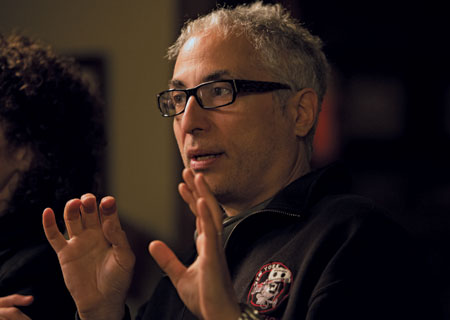 Barba tries to keep it light and collegial on the set of Grimm. (Photo: Scott Green/NBC)
Barba tries to keep it light and collegial on the set of Grimm. (Photo: Scott Green/NBC)
The first setup of the day is fairly straightforward. An SUV carrying Giuntoli and Mastrantonio pulls up to the Airstream, the two get out of the vehicle and exchange a few lines, then enter the trailer.
Barba and director of photography Marshall Adams have set up two cameras: a stationary one that captures a traditional master shot of the trailer and the bridge, and a boom-mounted camera that will dolly along with the SUV as it enters the gravel lot. That’s the one getting the lion’s share of Barba’s attention. Several takes are given over to camera operator Tim Spencer to ensure he is able to capture the headlights of the SUV through the window of an abandoned motorboat and then follow the progress of the car up to the trailer.
“Once you see the headlights through the window, let that take you,” Barba instructs him. “I want the car to reveal the trailer.” Satisfied that he’s captured the motion as he’d hoped to, he strolls over to give the actors a few notes.
“I told her I wanted to see a little affection when she sees the trailer for the first time,” he says when he returns to the shelter of the tent. As he later explains, “The script indicates that she’s familiar with the place. I want her to reveal that she’s been there before.” Those little indications of intimacy, Barba says, relate to the overall narrative, in which Burkhardt is still unclear whether the woman truly is his mother: “It builds trust in him. He starts to recognize that she is who she says she is.”
Barba’s chats with the actors are light and collegial. There isn’t any worried huddling, no sense that a lecture is in progress or that the actors are working out some emotional issue. Indeed, according to Giuntoli, Barba is accommodating in handling his cast. “He’s very good at picking the moments to give direction and the times to let go,” says the actor. “Sometimes he’ll just say, ‘Forget about your mark. Don’t worry about it. Just do what you feel.’”
That casual air is actually, as Barba later reveals, a studied practice. “One of my mentors, Edward Dmytryk, said that most of our job is to separate the actors from the machinery of filmmaking so that they feel they can just live in the moment and reveal themselves. I’m very careful about how I talk to them, because I don’t want them thinking, I want them just being.”
Later in the afternoon, at the Grimm basecamp, about a mile from the vacant lot set, Barba and the actors block a scene inside a mock-up of the Airstream interior that’s about three times the size of the actual thing. Here, as opposed to outdoors, he spends more time on the details of the line readings. For one exchange in particular, he encourages Giuntoli to brag a little about his familiarity with the world of the supernatural and for Mastrantonio to be pleasantly surprised to hear it.
These are the sorts of details that matter as much in the episode that’s being shot as they do to the larger narrative of the series, and it’s a sign of Barba’s role as executive producer that he understands and encourages it. As Giuntoli notes, “In episodic TV, the process can be so disjointed, so having someone like Norberto who chooses to work on the most crucial episodes is a great comfort to an actor. Actors can trust him because he’s got the greater picture in mind.”
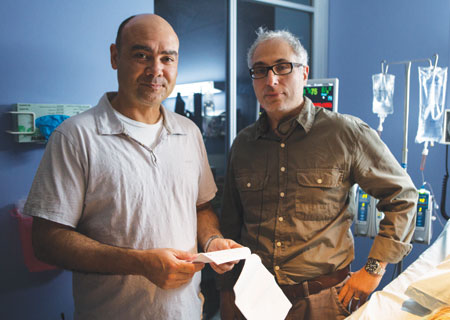 Barba talks it over with 1st AD Paul B. Pedreira (left). (Photo: Scott Green/NBC)
Barba talks it over with 1st AD Paul B. Pedreira (left). (Photo: Scott Green/NBC)
In fact, Barba admits to choosing which episodes of Grimm to direct based on their importance to the overarching narrative of the series. “There’s a danger of Grimm being a ‘creature-of-the-week’ show,” he says. “But what enriches it is the sense of an underlying mythology that’s being revealed. I’ve cherry-picked the episodes that reveal the mythology, and those episodes start a conversation among the audience about the direction the show and the story can go.”
Given that his background is so heavy in police shows, Barba may seem an unlikely candidate to direct—let alone executive produce—a show like Grimm, and he acknowledges that he was taken aback when the idea first arose.
“When I got the call, I thought, ‘fantasy/mythology?’ I’m more a procedural guy,” he recalls. “But then I saw it as a superhero story. There’s the superhero dilemma: A geek gets something that he perceives as a problem or a hindrance, something that turns him into a freak, but then he accepts it and learns to control it and master it and use it for good. It’s a discovery that starts with something scary and then reveals itself as a gift.”
As it turns out, Barba was, in a sense, raised on science fiction. Growing up in the Bronx in a family of Cuban immigrants (“I was born in the same building as Stanley Kubrick,” he delights in sharing), he would watch episodes of Star Trek and The Twilight Zone with his dad, who used to walk him across a bridge to Manhattan’s Astral Theater to see first-run Hollywood releases with Spanish subtitles.
His formal film education was peripatetic and thorough: two years at Columbia University, where, though an undergrad, he sat in on graduate film classes, learning a heavily theoretical European approach to cinema; two years at USC, where, “desperate to get my hands on a camera,” he “did a little bit of everything”; and eventually postgraduate work at AFI, where, he says, “the focus was all story and premise. The idea is that story is everything and if you know the story then you know where to put the camera and how to direct the actors and how to edit the pieces together.”
To pay off his student loans, he spent six years as a reserve with the Psychological Operations unit of the U.S. Army, where he made training films and documented military exercises and, through lucky strokes, missed assignment to active duty service in the first Gulf War and the war in Kosovo.
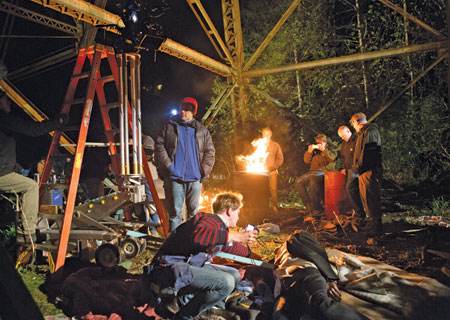 The crew sets up a murder site using the architecture of the city. (Photo: Scott Green/NBC)
The crew sets up a murder site using the architecture of the city. (Photo: Scott Green/NBC)
In the early ’90s, fresh out of AFI, Barba was directing low-budget films when he got a call from director Donald Petrie, who was shooting the pilot for a Twin Peaks-ish series called Country Estates. As Barba recalls, “He asked if I was interested in getting his lunch, washing his car, and picking up his dry cleaning for no pay. I asked what I would get out of it. He told me I could shadow him, go to all meetings, casting, etc., and I would direct the pilot on paper. At any given moment on the set, he might turn to me and ask what I would do in that particular situation. And so I shadowed him, and he did stop everything one rainy night and asked me what I would do, as cast and crew watched. And after that he convinced the studio that I was the right person to direct the second unit scene that actually opened the pilot.”
That experience helped steer him, a few years later, to directing an episode of the short-lived drama Vanishing Son, and he didn’t enjoy the experience. “I thought, ‘I’m never gonna do this again. This is crazy,’ ” he remembers. “I was directing a schedule, not a story.” But after another made-for-TV feature, he landed the job that changed everything for him. “I got a gig on New York Undercover,” he says, “and I was so jazzed. We were on the streets, it was handheld, and I was home. It was really exciting, and it reached a demographic that no one else had. Each show was fresh and had different challenges.”
Since then, Barba has been almost exclusively employed as an episodic TV director, coming to trust his ability in the medium and his maturation as an artist. “When I started,” he admits, “it was terrifying. You have eight days to shoot, and you have to think on your feet a lot. I went through a period when I over-planned everything and if there was a curveball thrown at me then I found myself really scrambling. But as I evolved, I found that preparation gives you the freedom to trust your voice and your instincts and your actors and crew and make changes you hadn’t planned. I want to take advantage of what the other artists on the set have to offer, and I can serve as the filter and select what’s best from their ideas.”
Good to his word, Barba regularly demonstrates flexibility on the set. While shooting the scene inside the Airstream someone on the camera crew comes up with an inspiration for a new way to light and stage the shot and shares the suggestion with the director. “Oh, that’s nice! That works. Let’s do that,” Barba says enthusiastically. Then he turns to the actors. “We’ve discovered a really pretty shot here,” he tells them, and he begins working with them to tweak the blocking.
Discussing the moment later, Barba says that he has learned not to over-prepare for a day’s work. “I come to the set with a definite plan,” he says. “But I like to find the moments that happen on the set. John Huston, I think, said the best directors find the accidents and take advantage of them. As an executive producer I see a lot of directors, and some of them are, I think, too rigid with their plans. It’s a collaborative process, and you have to allow the actors and the camera crew to contribute. I try to empower the crew to be able to feel that they can say ‘look what I found.’ And maybe I like it and maybe I don’t. But they don’t feel that it won’t be considered. They feel like they can contribute.”
This moment of improvisation is, according to 1st AD Paul B. Pedreira, not at all unusual for Barba. “He’s firm when he needs to be,” Pedreira says, “but there’s no ego, and he’s open to hearing from others. He’s happy to hear a good idea; it doesn’t have to be his.”
That openness extends to the episodic directors whom Barba oversees in his role as executive producer on the show. “He spends a lot of time with guest directors in prep,” Pedreira notes, “and then leaves them to themselves when they shoot. It’s their episode. I’ve been on shows where directors have been micromanaged, but this is more of a director’s show, and he makes them feel welcome.”
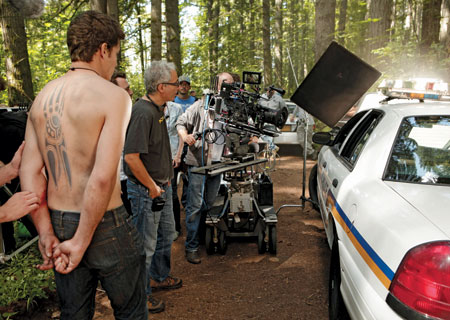 Barba (in black shirt) likes to use the natural resources of Portland to
Barba (in black shirt) likes to use the natural resources of Portland to
reflect the mood of the show. (Photo: Scott Green/NBC)
As Barba puts it, his personal experience as an episodic director has taught him to use a delicate touch when overseeing others. His approach ensures that the quality and integrity of the series are maintained while allowing the directors to bring new vitality and freshness to the show. “I believe in the philosophy that you can’t reinvent the show in a week but you can leave us with something that makes the show better,” he says. “I spend more time choosing the guest directors and preparing with them than supervising them. My job is to prep them and make sure they know the story and the world so well that I don’t have to be there. We become partners, and if they need me then I guide them. I look at the dailies, and I might mention to them something like, ‘Try not to shoot her with a wide lens so much.’ But I don’t hover. If I’m doing my job right, I’m prepping the next director while the current director is working.”
“It’s quite a big job that he’s got,” says co-creator Greenwalt. “He’s directing episodes and prepping other directors and working with new creatures and cutting together what he’s shot. But he’s incredibly well organized. And we trust him with our vision for the show.”
That trust is vital to what Barba does. “When you run a show, it’s your baby,” he remarks. “I’m the only producer who’s up here in Portland, and now that I’m established I have their trust. They know that I’ll see their vision through and add to it. I can keep the look and feel consistent, and if something needs to be changed, they know that I’ve got the big picture in mind.”
That happens, in fact, during the day, when the crew is turning around to get some additional footage of the scene inside the Airstream. The season two premiere Barba is directing is actually the middle piece of a three-episode arc, and the director of the final portion, Terrence O’Hara, is prepping his segment when he runs into a question about a detail of staging. Barba has yet to shoot the scenes of his episode that will mesh with the bit that O’Hara is prepping, so he tells the guest director to take the initiative: “Do what you need to. I’m open. I can change my part to make the two parts fit.”
Such openness is key to Barba’s larger vision of his career. “I’ve got to where I wanted to be, but it hasn’t been easy. I’ve been working nonstop for 12 years. It’s exciting. And I have tremendous gratitude for the people who supported me and who believed in me and who are now my partners in crime.” And whether those partners are humans or wesen, you sense that he has equal respect for them all.